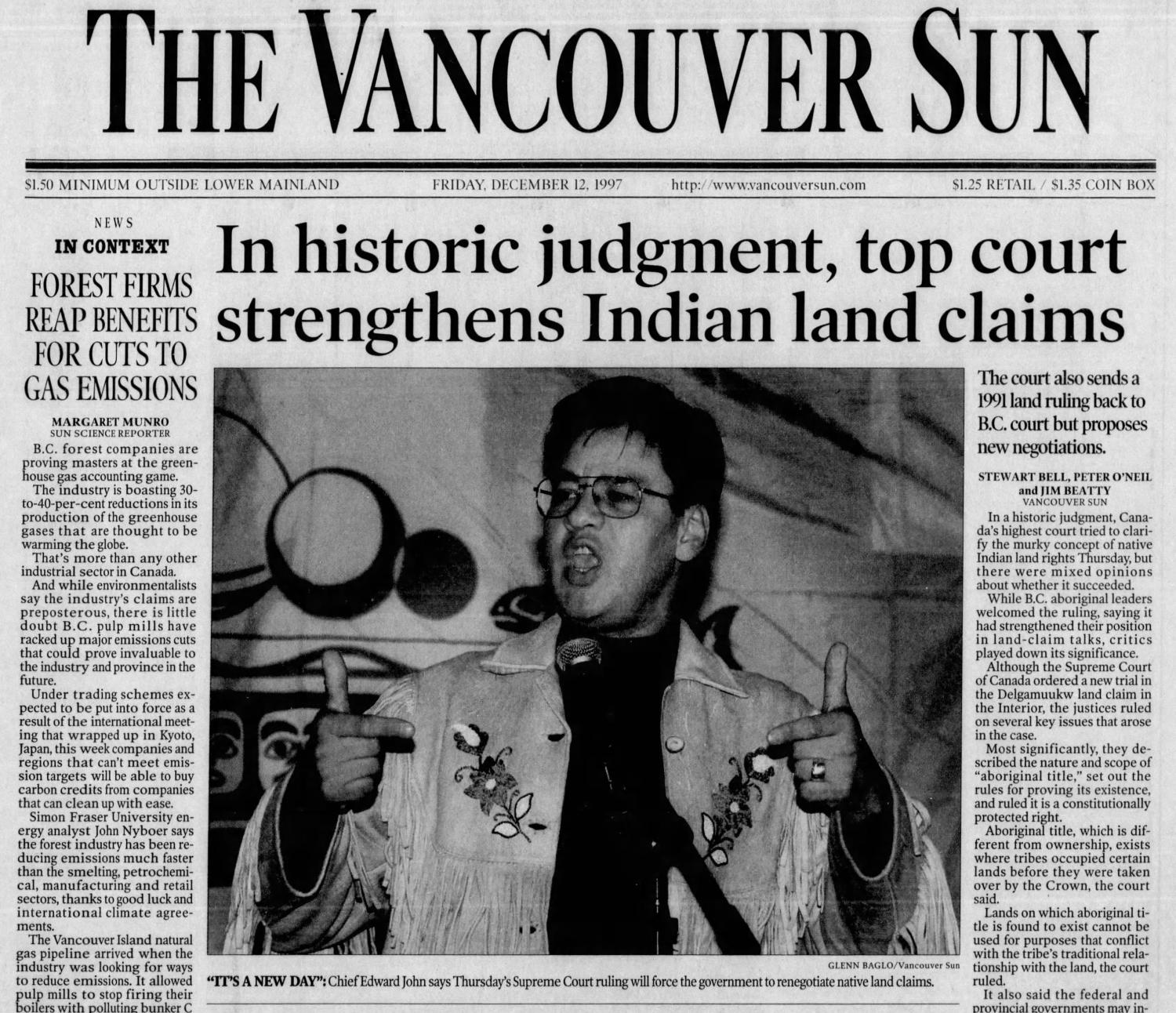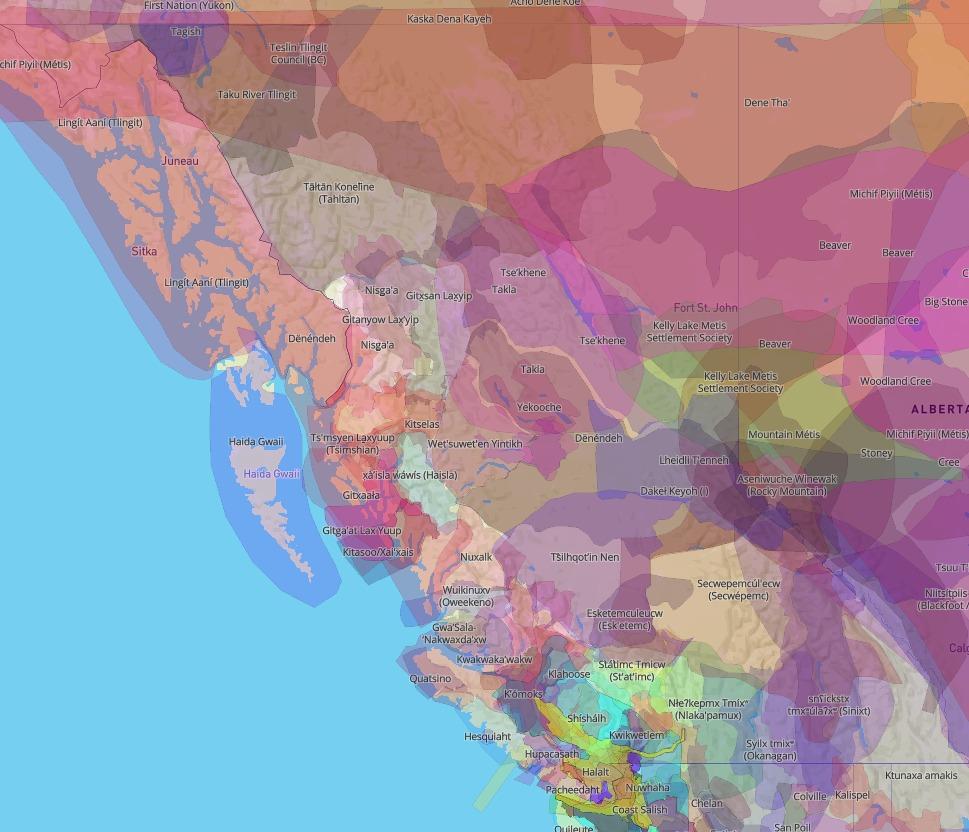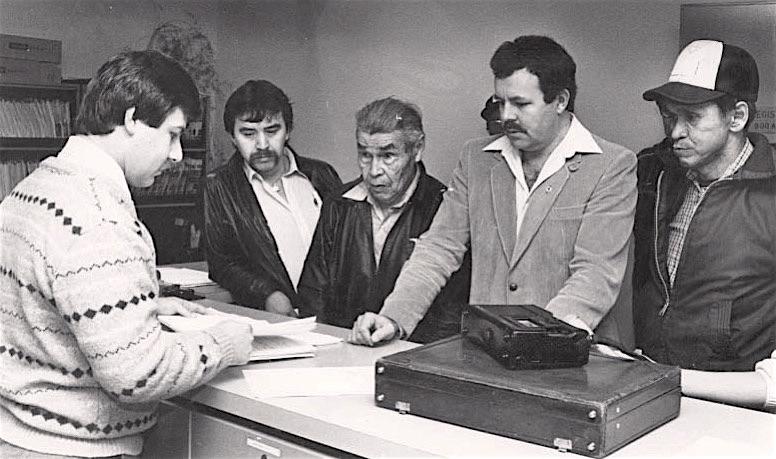The Delgamuukw Decision
A landmark court decision for energy projects, land rights and Indigenous oral history
Date: 1997
In 1984, the Wet'suwet'en and Gitxsan had grown impatient with the federal government’s slow land claims process. Meanwhile, the British Columbia government refused to negotiate and had recently begun to allow clearcutting in the Wet'suwet'en and Gitxsan’s ancestral territory without their permission. So, the hereditary chiefs of both nations took the province to court, using funds raised from bingo, bake-offs and other community events. Their lawsuit claimed title to more than 58,000 square kilometres of land across B.C.’s central northwestern region, where each nation has lived for millennia. Like the Calder case before it, the Wet'suwet'en and Gitxsan charged the provincial government with failing to extinguish the title to their traditional lands.
The trial began at B.C.’s Supreme Court in 1987. And, in an historic first for Canada, Indigenous elders testified to each nation’s longstanding occupation of their respective lands using oral history as evidence. Some witnesses sang songs describing family lineages and local trails. Some spoke in their traditional tongue. But ultimately the lawsuit was unsuccessful. Four years after it started, Justice McEachern ruled that any Aboriginal title that may have existed was extinguished when the province joined Canada in 1871. The justice’s remarks have since been criticized for their offensive tone and blanket dismissal of Indigenous oral history as valid evidence. “There is no doubt, to quote [philosopher Thomas] Hobbes, that Aboriginal life in the territory [before contact] was, at best, ‘nasty, brutish and short,” Justice McEachern remarked at one point.
Undeterred, the Wet'suwet'en and Gitxsan next took the case to the B.C. Court of Appeals, where they made some progress in 1993. Though the court agreed that the nations did not possess title, it offered a staggering victory to the plaintiffs and Indigenous communities across the province: governments, it ruled, must consult Indigenous people before giving the green light to any major projects that may infringe on their Indigenous rights. This precedent now defines the approach energy companies must take to complete resource-extraction projects in B.C.
Following this significant win, the Wet'suwet'en and Gitxsan pressed on. The Delgamuukw Gisday’wa case came before the Supreme Court of Canada in June 1997. The court case’s name derives from the lead Gitxsan claimant, Delgamuukw, and a Wet’suwet’en claimant named Gisday’wa; Delgamuukw and Gisday’wa are symbolic hereditary chief names passed down from one generation to the next. On Dec. 11, 1997, the court ruled that the Wet'suwet'en and Gitxsan had not yet proven title to the land and recommended a retrial. However, in a historic victory, the court reaffirmed Aboriginal title as a constitutionally-protected right and said that provinces could not extinguish title alone as it would infringe upon federal jurisdiction. The justices clarified how a First Nation can successfully prove Aboriginal title by proving “sufficient, continuous and exclusive” occupation of the territory in question. The court also made clear that Aboriginal title extends to the natural resources within that territory. Lastly, the court criticized Justice McEachern's approach to Indigenous oral history, emphasizing that it does indeed count as valid evidence. The Wet'suwet'en and Gitxsan had hoped to reclaim their land and have power over all decisions therein. Though not a victory, the decision was a triumph nonetheless.
To this day, Delgamuukw Gisday'wa carries a massive legacy. It made Indigenous consent a crucial factor in all resource-extraction projects in Canada. And it transformed the way governments and Indigenous communities understand Aboriginal title and rights, laying the foundation for all future territorial claims, most notably the Tŝilhqot'in Nation’s successful land title claim in 2014. The Wet'suwet'en say the case has also been used to advance Indigenous land rights outside Canada in places like New Zealand. However, it did not resolve the issue of title for the Wet'suwet'en or the Gitxsan. Both nations remain in treaty negotiations with the government, and a retrial remains a possibility.
Sources:
1. Beaudoin, Gerald A. Delgamuukw Case. The Canadian Encyclopedia, 18 Aug. 2017, www.thecanadianencyclopedia.ca/en/article/delgamuukw-case.
2. Forester, Brett. The Delgamuukw Decision: Putting the Wet'suwet'en Conflict in Perspective. APTN News, 4 Mar. 2020, www.aptnnews.ca/national-news/the-delgamuukw-decision-putting-the-wetsuweten-conflict-in-perspective/.
3. Forester, Brett. The Delgamuukw Decision: Wet'suwet'en and Gitxsan Rights Suffer a Setback in B.C. Court. APTN News, 6 May 2020, www.aptnnews.ca/national-news/the-delgamuukw-decision-wetsuweten-and-gitxsan-rights-suffer-a-setback-in-b-c-court/.
4. Forester, Brett. The Delgamuukw Decision: When the 'Invisible People' Won Recognition. APTN News, 10 July 2020, www.aptnnews.ca/national-news/the-delgamuukw-decision-when-the-invisible-people-won-recognition/.
5. French, Diana. Defender of the Wet'suwet'en (Review of Song of the Earth: The Life of Alfred Joseph by Ross Hoffman with Alfred Joseph). BC Booklook, 18 Nov. 2019, bcbooklook.com/gisday-wa-chief-of-the-wetsuweten/.
6. Hernandez, Jon. How a Landmark B.C. Court Case Set the Stage for Wet'suwet'en Anti-Pipeline Protests. CBC News, 13 Feb. 2020, www.cbc.ca/news/canada/british-columbia/delgamuukw-court-ruling-significance-1.5461763.
7. Hurley, Mary C. ABORIGINAL TITLE: The Supreme Court of Canada Decision in Delgamuukw v. British Columbia. Law and Government Division at Parliamentary Research Branch, Jan. 1998, publications.gc.ca/Collection-R/LoPBdP/BP/bp459-e.htm.
8. Jang, Trevor. Twenty Years after Historic Delgamuukw Land Claims Case, Pipeline Divides Gitxsan Nation. The Discourse, 7 Feb. 2017, thediscourse.ca/urban-nation/twenty-years-historic-delgamuukw-land-claims-case-pipeline-divides-gitxsan-nation.
9. A Lay Person's Guide to DELGAMUUKW. BC Treaty Commission, Nov. 1999, www.bctreaty.ca/sites/default/files/delgamuukw.pdf.
10. Nolan, Brent. Delgamuukw v British Columbia. Assembly of First Nations, 28 Aug. 2019, www.afn.ca/timeline/delgamuukw-v-british-columbia/.
11. Vandenberg, Daryl. 19th Anniversary of Historical Delgamuukw Case with Wet'suwet'en and Gitxsan. My Bulkley Lakes Now, 12 Dec. 2016, www.mybulkleylakesnow.com/12328/19th-anniversary-historical-delgamuukw-case-wetsuweten-gitxsan/.





